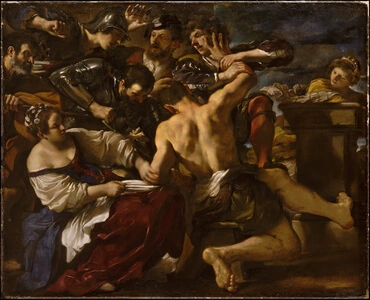1
Wehe denen, die Unheil sinnen und Böses vorbereiten auf ihren Lagern! Beim Morgenlicht führen sie es aus, weil es in der Macht ihrer Hand steht.
2
Und sie begehren nach Äckern und rauben sie, und nach Häusern und nehmen sie weg; und sie verüben Gewalttat an dem Manne und seinem Hause, an dem Menschen und seinem Erbteil.
3
Darum, so spricht Jehova: Siehe, ich sinne ein Unglück wider (O. über) dieses Geschlecht, aus dem ihr eure Hälse nicht ziehen und unter welchem ihr nicht hoch einhergehen werdet; denn es ist eine böse Zeit.
4
An jenem Tage wird man einen Spruch über euch anheben und ein Klagelied anstimmen. Es ist geschehen! wird man sagen; wir sind gänzlich verwüstet: das Teil meines Volkes vertauscht er; wie entzieht er es mir! Dem Abtrünnigen verteilt er unsere Felder.
5
Darum wirst du niemand haben, der in der Versammlung Jehovas die Meßschnur wirft, um ein Los zu bestimmen (Eig. der
die Meßschnur als Los wirft.)
6
"Weissaget (Eig. Träufelt Worte; so auch nachher) nicht", weissagen sie (die falschen Propheten.) Weissagt man nicht jenen (d. h. den in v. 1 u. 2 angeführten Gottlosen,) so wird die Schmach nicht weichen.
7
Du, Haus Jakob genannt, ist Jehova ungeduldig? (O. zornmütig) oder sind dies seine Taten? Sind meine Worte nicht gütig gegen den, der aufrichtig (O. rechtschaffen) wandelt?
8
Aber noch unlängst lehnte sich mein Volk als Feind auf: vom Oberkleide ziehet ihr den Mantel denen ab, die sorglos vorübergehen, vom Kriege abgewandt sind;
9
die Weiber meines Volkes vertreibet ihr aus dem Hause ihrer Wonne, von ihren Kindern nehmet ihr meinen Schmuck auf immer. -
10
Machet euch auf und ziehet hin! denn dieses Land ist der
uheort nicht, um der Verunreinigung willen, die Verderben bringt, und zwar gewaltiges Verderben.
11
Wenn ein Mann da ist, der dem Winde nachgeht und betrügerisch lügt: "Ich will dir weissagen von Wein und von starkem Getränk", der wird ein Prophet dieses Volkes sein.
12
Sammeln werde ich dich, Jakob, ganz Sammeln; versammeln, ja, versammeln werde ich den Überrest Israels. Ich werde ihn zusammenbringen wie die Schafe von Bozra, wie eine Herde inmitten ihrer Trift; sie werden lärmen vor Menge der Menschen.
13
Der Durchbrecher zieht herauf vor ihnen her; sie brechen durch, und ziehen durch das Tor und gehen durch dasselbe hinaus; und ihr König zieht vor ihnen her, und Jehova an ihrer Spitze.







